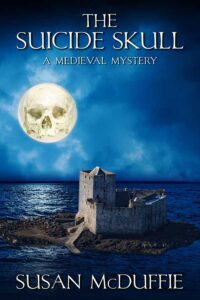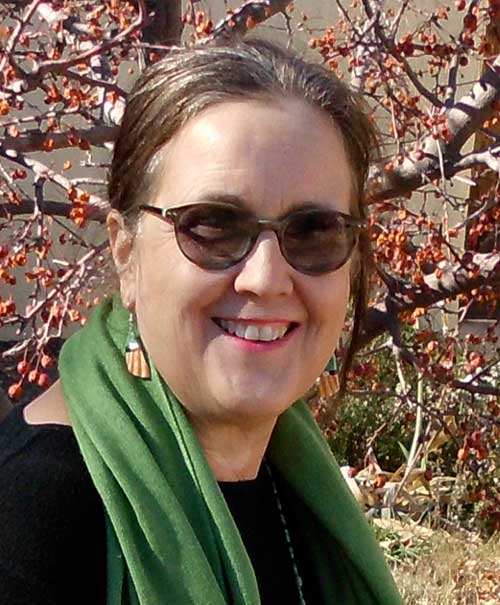
The Suicide Skull
 Scotland, 1396: Euphemia MacPhee lives alone in a witch’s cave with her healing herbs and an ancient skull for company. Her reclusive life shatters the day she learns that her four-year-old son, fostered on the Isle of Barra, has mysteriously fallen ill. Euphemia sails to remote Kisimul Castle to nurse the boy and soon discovers he has been poisoned. Why would someone strike at an innocent young child? Can she trust anyone there to help her fight this evil?
Scotland, 1396: Euphemia MacPhee lives alone in a witch’s cave with her healing herbs and an ancient skull for company. Her reclusive life shatters the day she learns that her four-year-old son, fostered on the Isle of Barra, has mysteriously fallen ill. Euphemia sails to remote Kisimul Castle to nurse the boy and soon discovers he has been poisoned. Why would someone strike at an innocent young child? Can she trust anyone there to help her fight this evil?
While tending to her son Euphemia finds the corpse of a beautiful woman, drowned in a holy well. That murder imperils her son for a second time and threatens Euphemia’s own safety.
Euphemia must utilize every remedy available to confront ancient malice and long-buried wounds, as she struggles to save her son and to clear her own name.
Read an Excerpt
Chapter 1
My mother did not have the Second Sight. I got it from my father. The Sight, however, will not be bidden like a servant; it comes and goes as it pleases. We who have the Sight must serve it; it does not serve us.
The Sight showed me nothing of what was to befall on the day that Griogair arrived.
I had slept restlessly, disturbed by unsettling dreams I could not quite recall upon waking. Dreams of my sweet son so often troubled my sleep, or dreams of the nunnery, back on Iona. I had learned to sleep poorly.
It was a fine, fair day, that day in May, the sky a rare blue over the Sound, the sun shining, and a brisk wind sending clouds scudding overhead, like little lambs playing on the machair. I looked out the doorway of the cave I now called my home and almost smiled at my fancies.
My father had found me this place, after I left Iona and realized life at Finlaggan, or even the more isolated Ballinaby, would suit me no longer. The cave had been long abandoned. It was said a witch had lived there long ago, but no one had dwelled there for years and so no one complained when I settled in. A spring further up the hill provided fresh water. As I had entered the dank and dark cavern I saw the skull, grinning at me through some cobwebs and spider’s webbing. It sat on an alcove carved from the living rock. When I asked, later, the local folk swore it was the skull of a suicide, and that water drunk from that grisly cup would cure the falling sickness.
I’d not learned that remedy from my mother, or my grandfather, but I’d dusted off the skull, and the shelf, and set it back to keep watch over my new domain. And it had remained there, as my guardian, for…how long now? Three years.
No one disturbed my quiet this day. No local folk climbed the steep path up the hill to me in search of cures. I had no doubt most folks thought me another witch, like the one that had lived here so many years ago. For others, the reality of my life was worse than witchcraft. A nun who had violated her vows and fled the convent. Still, people came sometimes, for babies will teethe and joints will ache, and was I not one of the healing folk, the Beatons, on my mother’s side? Despite my own sad history.
So I mused on this while I sat on a bench outside, drowsing but spinning an uneven yarn, watching the Sound with idle eyes. It crossed my mind to pray, as I watched the sun climb in the sky. It grew close to sext, but my prayers had deserted me long ago. Or I had deserted them.
Across the Sound I saw the dark bulk of Colonsay, my father’s home. But closer something caught my eye, a craft amidst the waves. A small birlinn, carrying six men. The sail had been raised to catch the breeze and I saw no one rowing; no need for that with such a favorable wind. I watched for a time, thinking they would head towards Colonsay, but the boat began tacking against the wind, making for my own cove and the small shingle beach that edged it.
Visitors, then. No one I recognized. Not my father’s men from Islay, bringing supplies and news of home.
I set down the spindle on the bench and wiped my hands, greasy from the wool, on my skirt while my heart began to pound like some wild thing. I stood to see. The boat still approached and would be landing soon. I patted my hair a bit to smooth it. How long it had grown, how neglected. I tried to hide its unruliness by tucking it under my sadly threadbare and wrinkled coif. Then I adjusted my habit, the black dye faded now to a nondescript brown, sat down again on the bench, picked up my spinning, and waited, my heart still hammering and my throat dry.
I heard the sounds as the men beached the boat, their voices as they stowed the sail. I could not catch the words. Then I heard crunching steps on the shingle as one of the men left the boat and began to climb the steep path up the hill.
I kept on with my spinning, fighting the urge to set it down and flee, disappearing into the hills like some wild doe where no one could find me. The thread snapped, and I started my work again.
When the man finally emerged at the top of the trail, I did not recognize him. He was large, broad-shouldered, with chestnut hair and a beard slightly redder, his face sea-burned, with laugh lines about the eyes. He wore the linen shirt and woolen mantle of an isles-man. The stranger gained the top of the trail and stood a moment to catch his breath, looking at me where I sat spinning on the wooden bench in the sunshine.
“Are you Mistress Euphemia?” he asked. “Or,” he glanced warily at my habit and once white coif, “Sister Beathag?”
I met his gaze but did not stand. “Yes. And you?”
“I am Griogair MacRuairi. The MacNeil sent me. From Barra.”
I put the spindle down. “And how am I to be certain of that?” I watched him through narrowed eyes.
He smiled a half smile. “The MacNeil himself thought you might be wanting proof.” He reached inside his mantle, took out a letter, and handed it to me. “Here. Stamped with his own seal, it is. I watched him do it.”
“You are the MacNeil’s man?” I asked. He nodded. I did not bid him sit down but rudely let him stand while I glanced at the message. Folded parchment, and indeed sealed with the mark of the MacNeil of Barra. I had seen the mark before, on the contract for Eugenius’s fostering. I broke the seal, unfolded the paper and scanned the lines. The parchment dropped to my lap and I felt an icy hand squeeze my heart.
“Eugenius.”
“My lady,” the man replied. He looked distressed himself; I could see concern behind his hazel eyes. “He is ill.” He paused and swallowed before continuing. “I am sorry indeed to be telling you of this. The MacNeil himself sent me here to fetch you. Will you come to Barra?”
My son, my own little heart of my heart—my tongue felt leaden and I could barely form my words. “What ails my son?” The letter had not given details. Just a few lines. Your son is ill. Come to Kisimul.
“A fever, when I left. They had thought it nothing of consequence, but he grew worse. So they sent me here to fetch you.”
“Because I am a healer, or because I am his mother?”
The man flushed. “Both, I am thinking. Although there are healers on Barra, and others at Howmore on Uist, there are no Beatons there.”
“Yes.” I fought to keep my voice calm. I must think, remember which herbs to pack. I could not panic, not with my son’s health at stake. “I will get my things,” I told him. “I shall not take long. But you will be hungry and thirsty,” I added, belatedly, “and what of the men with you?”
“They’ve food and uisge beatha, and I think are more eager to nap than climb up here and back down again.”
I rose, my throat dry as rough stone. “Come away in, then. You can eat while I gather my things.”
He followed me inside, glancing around the dark cavern that I called my home. I’d not whitewashed the walls when I’d come to stay here. It must seem a dreary place.
“I’ve only water. But here is a bannock, and some cheese.” I struggled to keep my voice from trembling. “Eat. I’ll be but a moment.”
His green eyes flicked around the cave and I saw him raise his hand as if to cross himself, then stop. “What is that?”
I followed his glance. “The skull of a suicide.” Despite the rapid thudding of my heart, I almost smiled to see his quickly repressed shudder. “Water drunk from it cures the falling sickness.”
“I do not suffer from that,” he said, a little stiffly. “God be praised.”
I left him to eat my stale bannocks and a scrap of dried-out cheese, and started gathering a few things together. My warmest mantle, my other shift, and the little jacket I’d been sewing, thinking to send it to Eugenius at some time. Now I could take it to him myself, and pray to God he’d live to wear it. Some remedies for fever I must take, whatever herbs might be of use. Willow bark, cress, and wood sorrel. Cuckoo’s flower. What else?
“Did he have a rash?”
“I’m not knowing.”
“By the Virgin’s teeth,” I cursed, “did they tell you nothing? How am I to know what is needed?”
“’Tis you who are said to have the Sight,” he responded evenly, setting down his bannock for a moment.
“Well, it told me nothing of this.” I bit my lip to stop the trembling and took a bundle of dried cuckoo’s flower, feeling the leaves crumble a bit against my fingers, smelling the sweet scent of it, as I wrapped it in a linen cloth and tried to calm down, to breathe, to think of what else to pack.
“When did you last see your son?”
“Three years ago, when he was first fostered,” I replied, giving my bundle a final tug, making sure the knots were tight. “He had just been weaned.”
“You’ve not seen him since?”
I shook my head. “He went to be fostered with the MacNeil and his wife. It’s common enough,” I added as I saw his expression. He inclined his head in agreement.
“Aye, I was fostered myself.”
“My father has seen him, though, and sends word often. Are they kind to him?” I asked, the words falling from my lips before I could stop them.
He smiled. “They fair dote on him. You know the MacNeil’s wife lost a baby.”
I had not known. “And when was that?”
The man shrugged his broad shoulders. “About two years gone? Yes, that would be it. For I was off in Donegal, fighting for the Suibhnes. When I left, she was carrying, and when I returned there was no babe.”
“I see few folk here,” I said shortly. “I did not know.”
“Shall we go?” He scanned the table and reached for my bundle. “Have you any more bannocks? Fresh ones?” He almost grinned when I shook my head no. “It’s a long sail to Barra.”
Gaelic Glossary
Gaelic and other Pronunciation Guide
Many thanks go to Sharron Gunn, an incredibly knowledgeable and skilled instructor
for her great help and expertise in making this list possible. Sharron teaches a wonderful
on-line Gaelic class and many other fantastic classes. Many of her classes are offered
through Hearts through History Romance Writers ( www.heartsthroughhistory.com )
Stress is usually on the first syllable
CH pronounced as in loch or Bach; not as in church
ch pronounced as in church Gaelic:
Amadan (plural: Amadain): fool (ah-mah-dan) (ah-mah-deen)
Bean-Shìth: banshee; faerie woman or faerie wife; woman of the mound (ben-hee)
Birlinn: Scottish galley, varying in size from a few to many oars (bur-leen)
Brat: mantle (brat!)
Cailleach: old hag, nun, old woman, goddess in winter or death aspect (cah-lyaCH)
Copag: dock, a medicinal plant (co-pak)
Dia: God (jee-ah)
Dia dhuit: God be with you (literally: God to you) (jee-ah ghoot)
Each Uisge: Water horse (eh-aCH oosh-kuh)
Eilean: island (ay-lan)
Gille Mor: sword bearer (gil-lyuh more)
Glaistig: the gray slinking one, a female faerie — can be beautiful or ugly; hag or shegoat; also called maighdean uaine (green maiden) (glash-jeek)
Gruagach: the glaiserig’s male companion; ‘hairy’ ; in some dialects of Scottish Gaelic it
means ‘beautiful woman’ (groo-uh-gaCH)
Iorram: a rowing song (ir-ram)
Leamhnach: a small yellow flower, known as tomentil or bloodroot (lev-naCH)
Lèine: shirt made of linen; ‘saffron shirt’ is lèine cròch
Luchd-tighe: chief’s bodyguard; household men (luCHk tye-uh)
Machair: level or low land, a plain (maCH-ir)
Mo chridhe: my heart (mo CHree-yuh)
Muirteach: (Moor-tech)
Namhag: a small boat (nah-vak)
Nathrach: of a serpent nathair = serpent (nah-ir)
Samhain: the old Celtic festival falling before All Saints’ Day (sah-veen)
Sgian dubh: dagger (skee-an doo)
Sìthichean: the fairies (shee-ee-CHyun)
Sìthean: a fairie hill (shee-an)
Uisge beatha: whisky (literally, the water of life) (oosh-kuh beh-ah)
ùruisg: Goblin; half goat half man; he was the Gaelic equivalent of a brownie
(oo-rooshk)
Lowland Scots:
Bairn: child in the east of Scotland, north of England [behrn]
wean: child in the south west of Scotland [wayn]
Quaich: round saucer-like drinking cup– see Gaelic Cuach [kwayCH]
Praise for The Suicide Skull
This atmospheric tale, with shades of selkies and romance, transported me to fourteenth-century Scotland, complete with smoking peat, small boats called naibheag, and vials of wolfsbane. Euphemia MacPhee is a recluse on the island of Jura, but when her son, fostered to a prominent family on the mainland, is poisoned, she is called upon to cure him. Who would poison a four-year-old boy? Then a woman is found murdered, Euphemia is accused, and she and the handsome Griogair must clear her name. With prose that shines, this book recalls an old favorite classic, The Witch of Blackbird Pond, in its pacing, romance, and otherworldliness.
– Karen Odden, USA Today bestselling author of Down a Dark River
The author writes with clarity about the isles of western Scotland, the lives of both lairds and common people and reliance on boats, tides, and weather for transportation. This, together with the emotional setting—for instance, Euphemia’s feelings as she sees her son tended by foster parents and his acceptance of them as his true parents while viewing Euphemia as a stranger—adds depth and texture to the novel.
This is an immersive novel on many levels, with hints of possible future romance, ever-present danger and a cast of warmly realistic Scots making the best of a difficult land in a difficult time.
– Valerie Adolph, Historical Novels Review, February 2023
QUICK LINKS

Medieval Mysteries
A Mass for the Dead
The Faerie Hills
The Death of a Falcon
A Study of Murder
The Suicide Skull




